Mary Anne Yarde's Blog: The Coffee Pot Book Club , page 161
December 14, 2018
The Coffee Pot Book Club Book Of The Year Award 2018 — Finalists for the Historical Fiction and Historical Romance Categories #BookAwards #HistoricalFiction #HistoricalRomance

The Coffee Pot Book Club
Book Of The Year Award 2018

Finalists for Historical Fiction and Historical Romance

Historical Fiction Finalists
Blood and Ink, by D. K. Marley.
By Love Divided, by Elizabeth St.John.
Gifts of the Gods: Iron and Bronze, by Thomas J. Berry.
Honour the Dead, by John Anthony Miller.
Queen of the North, by Anne O’Brien.
Sons of the Wolf: Sons of the Wolf : Book #1, by Paula Lofting.
The Beaufort Woman (Beaufort Chronicles #2), by Judith Arnopp.
War King, by Eric Schumacher.
The winners of The Coffee Pot Book Club Historical Fiction Book of the Year will be announce on Myths, Legends, Books & Coffee Pots 27th December 2018
Historical Romance Finalists
A Gentleman’s Promise, by Penny Hampson.
A Ring of Midnight Orchids: Flowers of the Aristocracy (Untamed Regency #3), by Jackie Williams.
Forsaking All Other, by Catherine Meyrick.
The Laird of Blackloch: Book 2 in the Highland Rogue Series, by Amy Rose Bennett.
The winners of The Coffee Pot Book Club Historical Romance Book of the Year will be announce on Myths, Legends, Books & Coffee Pots 28th December 2018


<!-- /* Font Definitions */ @font-face {font-family:Times; panose-1:2 0 5 0 0 0 0 0 0 0; mso-font-charset:0; mso-generic-font-family:auto; mso-font-pitch:variable; mso-font-signature:3 0 0 0 1 0;} @font-face {font-family:"MS 明朝"; mso-font-charset:78; mso-generic-font-family:auto; mso-font-pitch:variable; mso-font-signature:-536870145 1791491579 18 0 131231 0;} @font-face {font-family:"Cambria Math"; panose-1:2 4 5 3 5 4 6 3 2 4; mso-font-charset:0; mso-generic-font-family:auto; mso-font-pitch:variable; mso-font-signature:-536870145 1107305727 0 0 415 0;} @font-face {font-family:Cambria; panose-1:2 4 5 3 5 4 6 3 2 4; mso-font-charset:0; mso-generic-font-family:auto; mso-font-pitch:variable; mso-font-signature:-536870145 1073743103 0 0 415 0;} @font-face {font-family:Garamond; panose-1:2 2 4 4 3 3 1 1 8 3; mso-font-charset:0; mso-generic-font-family:auto; mso-font-pitch:variable; mso-font-signature:3 0 0 0 1 0;} /* Style Definitions */ p.MsoNormal, li.MsoNormal, div.MsoNormal {mso-style-unhide:no; mso-style-qformat:yes; mso-style-parent:""; margin:0cm; margin-bottom:.0001pt; mso-pagination:widow-orphan; font-size:12.0pt; font-family:Cambria; mso-ascii-font-family:Cambria; mso-ascii-theme-font:minor-latin; mso-fareast-font-family:"MS 明朝"; mso-fareast-theme-font:minor-fareast; mso-hansi-font-family:Cambria; mso-hansi-theme-font:minor-latin; mso-bidi-font-family:"Times New Roman"; mso-bidi-theme-font:minor-bidi;} p {mso-style-noshow:yes; mso-style-priority:99; mso-margin-top-alt:auto; margin-right:0cm; mso-margin-bottom-alt:auto; margin-left:0cm; mso-pagination:widow-orphan; font-size:10.0pt; font-family:Times; mso-fareast-font-family:"MS 明朝"; mso-fareast-theme-font:minor-fareast; mso-bidi-font-family:"Times New Roman";} .MsoChpDefault {mso-style-type:export-only; mso-default-props:yes; font-family:Cambria; mso-ascii-font-family:Cambria; mso-ascii-theme-font:minor-latin; mso-fareast-font-family:"MS 明朝"; mso-fareast-theme-font:minor-fareast; mso-hansi-font-family:Cambria; mso-hansi-theme-font:minor-latin; mso-bidi-font-family:"Times New Roman"; mso-bidi-theme-font:minor-bidi;} @page WordSection1 {size:612.0pt 792.0pt; margin:72.0pt 90.0pt 72.0pt 90.0pt; mso-header-margin:36.0pt; mso-footer-margin:36.0pt; mso-paper-source:0;} div.WordSection1 {page:WordSection1;} </style> -->
Published on December 14, 2018 09:29
December 13, 2018
LA BEFANA – Italian Christmas folklore, by Cynthia Ripley Miller #Christmas #History #Italy @CRipleyMiller
 LA BEFANA – Italian Christmas folkloreBy Cynthia Ripley Miller
LA BEFANA – Italian Christmas folkloreBy Cynthia Ripley MillerAlthough I was born in America, my father and my maternal grandparents came from Italy to America and my paternal grandparents remained in Italy. So, I grew up with the idea of Santa Claus at Christmas time, but I also knew the Italian story of the old woman ‘La Befana’ from my parents.
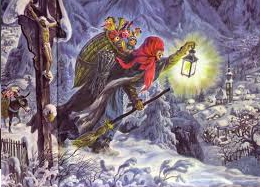
La Befana comes from the word ‘epifana’ meaning epiphany. The Epiphany is the holy and twelfth day after Christmas on January 6, celebrating the arrival of the Three Kings or Magi (wise men) in Bethlehem with gifts for the baby Jesus who they believed was the ‘king of the Jews’.
Wise Men On A Journey
The story is told that the Magi came to the house of La Befana while on their journey to Bethlehem. Like a good Italian housewife, she gave them refreshment and asked them about their travels. They shared with her that they were following a star that would lead them to a newborn king, a baby prophesied as a savior to the world, and that they wanted to bring him gifts and pay him homage. They asked La Befana to join them on their journey, but she refused saying she was too busy keeping her home.This is why she is often depicted with a broom. She was considered a ‘casalinga’ housewife and not a witch as some stories make her out to be.
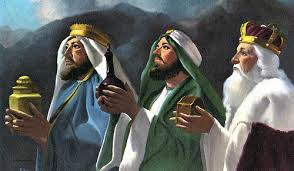
After the Magi left, La Befana felt remorse and stopped her sweeping. She gathered up some sweets as a gift and chased after the Magi to join them, but could not find them. Sorry for her choice, she continued to search for the baby Jesus, leaving sweets for all the children along the way, some say by their doors, others in their shoes or hanging stockings.
The legend adds that on every January 5th, the eve of the Epiphany, La Befana, still searching, brings sweets and toys to all the children who have been good during the year. In addition, a more modern element to the legend adds that if children have not been good, she will only leave them a lump of coal. My father is a native born Italian and says that he grew up with the belief that he would either get sweets (figs, dates, candy etc.) or a lump of coal in his shoes from La Befana. He claims he only received treats and never any coal. Hmm. I guess I believe him.
A Housewife More Than A Witch
La Befana ideally should be remembered as an old woman housewife who wore a kerchief and carried a broom—a symbol of her curse for choosing her household duties over honoring the baby Jesus—more than a witch, flying around on a broom. Either way, it’s a Christmas tradition wrapped in the spirit of the season that captures the imagination of children and adults alike. A song that Italian children chant on the eve of the Epiphany while waiting for La Befana:
La Befana vien di note The Befana comes at nightcon tutte le scarpe rotte with broken shoes col cappello alla romana with a Roman hat viva viva La Befana live, live, La Befana
***
On the Edge of Sunrise
Book One of the Long-Hair Saga

When love commands, destiny must obey. The year is AD 450. The Roman Empire wanes as the Medieval Age awakens. Attila the Hun and his horde conquer their way across Europe into Gaul. Caught between Rome’s tottering empire and Attila’s threat are the Frankish tribes and their ‘Long-Hair’ chiefs, northern pagans in a Roman Christian world, and a people history will call the Merovingians.
A young widow, Arria longs for a purpose and a challenge. She is as well versed in politics and diplomacy as any man … but with special skills of her own. Emperor Valentinian, determined to gain allies to help stop the Huns, sends a remarkable envoy, a woman, to the Assembly of Warriors in Gaul. Arria will persuade the Franks to stand with Rome against Attila.
When barbarian raiders abduct Arria, the Frank blue-eyed warrior, Garic, rescues her. Alarmed by her instant and passionate attraction, Arria is torn between duty and desire. Her arranged betrothal to the ambitious tribune, Drusus, her secret enlistment by Valentinian as a courier to Attila the Hun, and a mysterious riddle—threaten their love and propel them into adventure, intrigue, and Attila’s camp. Rebels in a falling empire, Arria and Garic must find the strength to defy tradition and possess the love prophesied as their destiny.
Amazon
The Quest for the Crown of Thorns Book Two of the Long-Hair Saga

AD 454. Three years after the Roman victory over Attila the Hun at Catalaunum, Arria Felix and Garic the Frank are married and enjoying life on Garic’s farm in northern Gaul (France). Their happy life is interrupted when a cryptic message arrives from Arria’s father, the esteemed Senator Felix, calling them to Rome. At Arria’s insistence, but against Garic’s better judgment, they leave at once.
On their arrival at Villa Solis, they are confronted with a brutal murder and a dangerous mission. The fate of a profound and sacred object—Christ’s Crown of Thorns—rests in their hands. They must carry the holy relic to the safety of Constantinople, away from a corrupt emperor and old enemies determined to steal it for their own gain. But a greater force arises against them—a secret cult who will commit any atrocity to capture the Crown. All the while, the gruesome murder and the conspiracy behind it haunt Arria’s thoughts.
Arria and Garic’s marital bonds are tested but forged as they partner together to fulfill one of history’s most challenging missions, The Quest for the Crown of Thorns.
Amazon
Cynthia Ripley Miller
 Cynthia Ripley Miller’s short fiction has appeared in anthologies and ezines. A Ring of Honor-Circle of Books Award winner and Chanticleer International Chatelaine Award finalist for her novel, On the Edge of Sunrise, she has reviewed for UNRV Roman History, and blogs at Historical Happenings and Oddities: A Distant Focus and on her website, click HERE!
Cynthia Ripley Miller’s short fiction has appeared in anthologies and ezines. A Ring of Honor-Circle of Books Award winner and Chanticleer International Chatelaine Award finalist for her novel, On the Edge of Sunrise, she has reviewed for UNRV Roman History, and blogs at Historical Happenings and Oddities: A Distant Focus and on her website, click HERE! On the Edge of Sunrise and The Quest for the Crown of Thorns are the first two novels in her Long-Hair Saga series set in Late Ancient Rome and France.
Also connect with Cynthia on: Twitter• Facebook
Published on December 13, 2018 23:00
December 12, 2018
Christmas Celebrations in 1399: A Sharp Lesson in Keeping your Friends Close. Your Enemies Closer. And your Family Closer still. By Anne O’Brien #Christmas #History @anne_obrien
 Christmas Celebrations in 1399
Christmas Celebrations in 1399A Sharp Lesson in Keeping your Friends CloseYour Enemies CloserAnd your Family Closer stillBy Anne O’Brien
The celebrations over Christmas and the New Year in 1399, including the Epiphany on 6th January 1400, were the first to be held by King Henry IV after his usurpation of the throne. He was still a widower after the death of Mary de Bohun, but Henry had his young family to entertain. Four sons and two daughters; Henry, Thomas, John and Humphrey; Blanche and Philippa. Prince Henry was the oldest son and oldest child at 12 years. They would expect some Christmas jollity.
It was in fact a relatively quiet Christmas, held at Windsor, where Henry was apparently recovering from food-poisoning.
 Windsor Castle
Windsor CastleBut there would be masques and jousting, feasting and music, Henry being famous for keeping his own troop of minstrels and mummers, as his father John of Gaunt had done before him.

Furthermore Henry was planning a great tournament on the day of the Epiphany, 6th January, at Windsor, to which the lords of the realm were invited, to celebrate the new reign. For the royal youngsters it would be a time of great excitement.
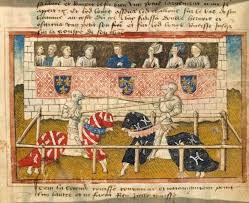
What Henry did to know was that on 17th December, in the Abbot's lodgings at Westminster, a secret meeting had been held by some of these prominent lords who were invited to the Epiphany merriment, to hatch a plot. To assassinate Henry and his four sons on the occasion of the tournament and to restore King Richard II, who was at this time imprisoned in Pontefract castle, to the throne.
What Henry could never have guessed, even if he had heard rumours of the conspiracy, was that the prime plotters were members of his own family, cousins or second cousins or connected by marriage, and some of the most powerful magnates at his court.
- Edward, Duke of Aumale, heir to the Duke of York and so Henry's cousin.- John Holland, Duke of Exeter, married to Henry's sister Elizabeth.- Thomas Holland, Duke of Surrey, John Holland's nephew.Both of the Hollands were related to Henry through the marriage of their mother Joan of Kent to Edward, the Black Prince.- Thomas, Earl Despenser, husband of Constance of York who was Edward of Aumale's sister.
Because of their previous loyalty to King Richard, these magnates had all been demoted from Duke to Earl, or Earl to Lord in the case of Despenser, in the first months of Henry's reign. For this reason they had a particularly sharp axe to grind.
Included in the conspiracy was young clerk, Richard Maudeleyn, who, dressed in suitable armour with a closed helm and on horseback, would pretend to be King Richard until the real king could be released from his imprisonment and brought to London. The plotters intended to stir the Londoners into supporting their previous king.
Imagine this: this group of royal cousins all celebrating Christmas and New Year with Henry at Windsor. Now there's a macabre thought, Henry still malingering from whatever had attacked his guts, while his close relatives sang and danced with the youngsters and contemplated their bloody massacre.
Henry's reign would all have been over by the Epiphany and Richard restored, except for the fact that Henry was warned on the 4th January, two days before the event. Who betrayed the conspiracy to him? The finger points very firmly at Edward of Aumale since he was the only one of the plotters not to pay the penalty for treason, and in fact helped Henry put down the risings. This scenario seems more likely than the rumour of a London prostitute who, picking up on the detail of the plot from a talkative customer, and passed the message on.
The end result was predictable. Henry, recovered from his ailment, lost no time in riding hard and fast for London, by a round-about route so that he would not be intercepted. Once there he lodged his children in the Tower for safety and then began to collect troops, paying out substantial sums for those who would take up arms in his name. London was quick to rise to Henry's support.
The rebels, hearing that they were discovered, fled, but were apprehended. Despenser was executed in Bristol when trying to find a ship to take him to France. Exeter, his escape-ship driven aground in a storm, was beheaded at Pleshey Castle, his head sent to be displayed on London Bridge. The Holland Earl of Surrey was executed in Cirencester with other plotters, his head sent to Henry in a basket.
A gruesome end to the plotters, but they would have assassinated Henry and his children without a qualm. In the days that followed, Henry sat in judgement on the rest of the rebels who were rounded up and also executed, including the hapless Maudeleyn. Twenty six were to meet their death but Henry pardoned many more, seeing the need sometimes to be magnanimous to win support for the young reign.
By February King Richard II too had died, it was said from self-inflicted starvation. A likely story.
So when you are enjoying your Christmas Celebrations, amidst the company of your friends and family, when you have had quite enough of them and would really like them to go home, remember the treacherous events that almost wiped out the family of King Henry IV in 1399 and count your blessings.
The Queen of the North
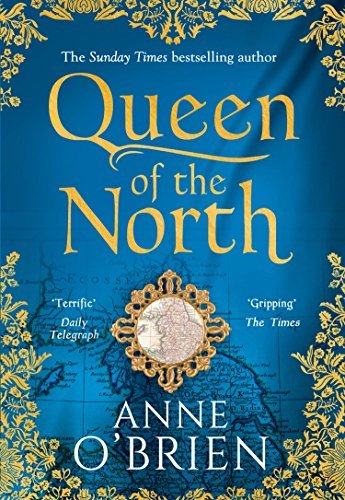
To those around her she was a loyal subject.In her heart she was a traitor.
1399: England’s crown is under threat. King Richard II holds onto his power by an ever-weakening thread, with exiled Henry of Lancaster back to reclaim his place on the throne.
For Elizabeth Mortimer, there is only one rightful King – her eight-year-old nephew, Edmund. Only he can guarantee her fortunes, and protect her family’s rule over the precious Northern lands bordering Scotland.But many, including Elizabeth’s husband, do not want another child-King. Elizabeth must hide her true ambitions in Court, and go against her husband’s wishes to help build a rebel army.
To question her loyalty to the King places Elizabeth in the shadow of the axe.
To concede would curdle her Plantagenet blood.
This is one woman’s quest to turn history on its head.
Amazon
Anne O’Brien
 Anne O’Brien was born in West Yorkshire. After gaining a BA Honours degree in History at Manchester University and a Master’s in Education at Hull, she lived in East Yorkshire for many years as a teacher of history.
Anne O’Brien was born in West Yorkshire. After gaining a BA Honours degree in History at Manchester University and a Master’s in Education at Hull, she lived in East Yorkshire for many years as a teacher of history.She now lives with her husband in an eighteenth-century timber-framed cottage in the depths of the Welsh Marches in Herefordshire, on the borders between England and Wales, where she writes historical novels. The perfect place in which to bring medieval women back to life.
Anne loves to hear from readers, you can find her: Website • Facebook • Twitter
Published on December 12, 2018 23:00
December 11, 2018
The Dangerous Game Of Snapdragon, by Tabetha Waite #Christmas #RegencyRomance #Mustread @TotallyTabetha
 The Dangerous Game Of Snapdragon.
The Dangerous Game Of Snapdragon.By Tabetha Waite
In my Christmas novella Ways of Love prequel, "How It All Began For the Baron," I showcase a popular parlor game of the era that would be considered extremely dangerous now. However, when you gather a lot of mischievous cousins in one house, things tend to get interesting. Snapdragon, also referred to as Flapdragon, was generally played on Christmas Eve. A bowl was filled with brandy, along with several raisins, and then set ablaze! The object of this game was to snatch a raisin from the inferno and eat it without injury. Sounds silly, I know, but in my story, there was a particular reason this game was incited in order to lure everyone to the bowl. The one who plucked out the most raisins would find their true love. That is definitely a worthy endeavor!
Nine Ladies Dancing
2018
Nine bestselling authors present a collection of sweet Regency romances in a boxed set you won’t want to miss!

Teach Me Under the Mistletoe by Kay Springsteen
What's a girl to do when she's never been kissed, and the worldly man she wants regards her as a child?
How It All Began for the Baron by Tabetha Waite
Cassie can’t stand her brother’s best friend… really.
Love’s Refrain by Patricia Kiyono
Lady Laura Montgomery, acting as her stepsister's chaperone, takes solace in poetry and her love of music. Can they comfort her as she faces the man who stole her heart ten years ago?
Mistletoe Magic by Donna Hatch
Can the mistletoe work its magic and open Evelyn’s eyes to true love at the Christmas ball?
The Matchmakers by Ruth J. Hartman
Jessie Selkirk has a mission — to take care of every stray cat she finds. But when Baldwin Rutledge steps into her barn looking for a cat, she develops a whole new interest.
The Ruse by Felicia Rogers
Luke Andrews, Baron of Stockport, is in trouble. He needs a wealthy bride to secure future funds for his financially shaky estate, but the lovely lady who’s caught his eye doesn’t have two sticks to rub together — literally.
Heart of Delight by Jenna Jaxon
He’ll do anything to be her heart’s delight — except tell the truth.
Mischief on Albemarle by Vivian Roycroft
Miss Beryl Wentworth is silently, desperately in love with her childhood friend, Finian Fitzwilliam, who unfortunately still treats her as if willing to shove her into the nearest mud puddle... until a quite charming rake asks her for the first two dances at the Hanover Square assembly room.
The Respectable Charades by Sherry Gloag
No one could have predicted the chain of events triggered by Jenny's discovery of her fiance's body in his library… least of all her chance to find true love.
Amazon
Tabetha Waite
 Award-winning author, Tabetha Waite, is included in this set, featuring a Ways of Love prequel novella. Find out what happened between Cassie and Gregory before "Why the Earl is After the Girl!"
Award-winning author, Tabetha Waite, is included in this set, featuring a Ways of Love prequel novella. Find out what happened between Cassie and Gregory before "Why the Earl is After the Girl!" Tabetha makes her home in Missouri with her husband and two daughters and loves to hear from her readers! Join her mailing list for updates and special content!
Published on December 11, 2018 23:00
Thomas Berry's fabulous book, Gifts of the Gods: Iron and Bronze, is now available on #NetGalley #Mustread #Booksgosocial @TBerryAuthor @LPOBryan
Have you heard…?
Thomas Berry's fabulous book, Gifts of the Gods: Iron and Bronze, is available on NetGalley for your reading pleasure. If you love great historical fiction then this is the book for you.
I Highly Recommend.

Gifts of the Gods: Iron and Bronze
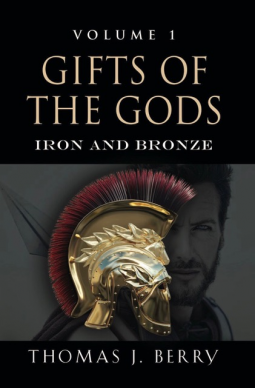
Five men and women in Ancient Greece are set on a dangerous journey of self-discovery during the bitter conflict of the Peloponnesian War.
Fifty years after King Leonidas of Sparta and his brave 300 fought to the death against Xerxes' Persian hordes at Thermopylae, a long and bloody rivalry erupted between the new superpowers of the era. The world of Ancient Greece in 480 B.C. was evolving into a new landscape. The isolated, socialist regime that grew from their king's sacrifice soon found itself at a vital crossroads with the democratic empire of Athens. The Peloponnesian War was not just a battle for political ideology but a brutal military campaign pitting the world's strongest army against the most powerful navy that ever sailed the seas. The fallout from this consummate struggle would change the course of human history forever.
Amidst the battlefields, ordinary men and women continue to work together behind walled cities and open farmland in order to survive. The Olympic festivals honor the gods with their renowned athletic contests and one woman finds herself in a deadly gamble when she must make an agonizing choice. A young helot slave longs for freedom while a new wife imperils herself to stand by her husband and home. When a wealthy aristocrat finds his world turned upside down, he must learn what true sacrifice and honor are all about. A Spartan officer who has lived by a strict code of tradition must discover new ways to cope in an unconventional war.
Five people from different walks of life must adapt to their changing world while remaining true to themselves. Who will survive the war and what will their lives be like when it's over?
To grab your copy of Gifts of the Gods: Iron and BronzeClick
HERE!
What is NetGalley?
How It Works (in their own words…)NetGalley connects publishers and authors to an enthusiastic community of early influencers who will help their book succeed: librarians and booksellers who order and recommend books to their patrons, media professionals who interview authors, reviewers and bloggers who write about books online and leave reviews on retail sites, and more. Publishers and authors list their titles on NetGalley for members to request, read, and review, and members gain free access to a vast catalog of digital review copies.
NETGALLEY FOR MEMBERS
NetGalley is a service to help readers of influence discover and recommend new books to their audiences. If you are a reviewer, blogger, librarian, bookseller, educator, journalist or other member of the media, you can use NetGalley for free to request, read, and recommend books before they are published.Your reviews and feedback are essential to publishers and other readers!
Become a NetGalley member today! NetGalley
NetGalley for Authors
Are you an author? Would you like to see your book on NetGalley. The Coffee Pot Book Club offers affordable NetGalley promotion. Click HERE to find out more.
Published on December 11, 2018 09:28
December 10, 2018
Masques, Mummers and Mutiny: Christmas Challenges at the Stuart Court, by Elizabeth St.John #Christmas #Stuart #History @ElizStJohn
 Masques, Mummers and MutinyChristmas Challenges at the Stuart CourtBy Elizabeth St.John
Masques, Mummers and MutinyChristmas Challenges at the Stuart CourtBy Elizabeth St.JohnThe generality of the gentry of the land soon learned the court fashion, and every great house in the country became a sty of uncleanness. To keep the people in their deplorable security, till vengeance overtook them, they were entertained with masks, stage plays, and sorts of ruder sports. Then began murder, incest, adultery, drunkenness, swearing, fornication, and all sort of ribaldry, to be no concealed but countenanced vices, because they held such conformity with the court example.Lucy HutchinsonMemoirs of the Life of Colonel Hutchinson
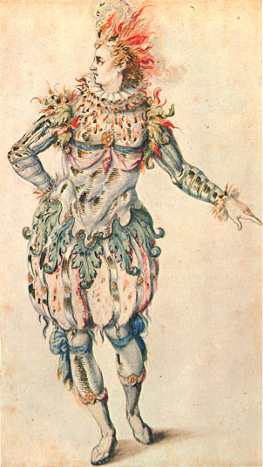 Masque Costume “A Star” by Inigo Jones
Masque Costume “A Star” by Inigo JonesThus Puritan Lucy described the Court of King James, writing some thirty years after his death. She prefaced her dim view of James by further writing “the court of this king was a nursery of lust and intemperance; he had brought in with him a company of poor Scots, who, coming into this plentiful kingdom, were surfeited with riot and debaucheries, and got all the riches of the land only to cast away.”
King James did not disagree he had a problem. In a speech before the Star Chamber in 1616 where he severely scolded the courtiers for their profligate and free-wheeling ways, he announced that they were no longer welcome in London to celebrate the festivities. “Christmas,” he announced, “should be celebrated properly.” The aristocracy should return to their country homes, and “keep hospitalitie” in the traditional English fashion “especially at Festiuall times, as Christmas and Easter, and the rest.”
Putting his finger on the pulse of his subjects, James had detected a sea change underway; Londoners were refusing to support the king’s extravagant Christmas celebrations, and the Court was under scrutiny for its immoral behavior. There was a widening gulf between court and city, and the king and his masque-producers recognized this.
So politically significant was this, that Ben Jonson wrote a text to be performed that year, entitled “Christmas His Masque.” And central to this work–which was more in the form of a mummers’ entertainment than the prohibitively costly extravaganzas he’d designed in previous years–Londoners, upper and working classes alike, were accused of failing to keep Christmas the way the king thought it should be observed.
Up until this point, the lords in their vast country houses celebrated Christmas with much merriment, feasting, dancing, and gambling, all under the jovial direction of the Lord of Misrule, head of the festivities. In the city, gift-giving and pageantry filled the days, all the way through Epiphany to Twelfth Night. In both locations, costs were getting way out of control, and resentment was creeping in from those who were being forced to pay for these excesses.
In this context, King James was his own worst enemy. To feed his passion for masques and sumptuous entertainment (shared by his wife and masque-star, Queen Anne of Denmark), especially around Christmas-time, he spent outrageously from the coffers filled by the good citizens of London. Resenting the expenditure of their taxes on these extravagant shows, Londoners found numerous ways to avoid these costly and obligatory demonstrations of love and loyalty. In fact, a court masque in 1610 which included a lavish gift to the king intended to show foreign diplomats “the loving support” of Englishmen for their king, had to be paid in advance by the treasury, since there was insufficient confidence that Londoners would cough up.
Enough of all this Christmas commercialism. The City had had enough.
As far as King James and his masque-maker Ben Jonson were concerned, there were even darker forces at work. Puritans. There was a conviction among reformed Christians that these drunken feasts and rude mummers could be traced to Roman times; and thus idolatrous pagans were the root of these Christmas evils. Elsewhere in his Star Chamber speech, King James accused the “Puritans and Nouelists” of undermining the very spirit of Christmas. He despised Puritans, and he felt their attacks on his court completely unjustified and misplaced.
And so, back to Ben Jonson’s masque. Always one to smooth over sticky situations and weave current political messages into his performances, in 1616 Jonson wrote a simple throwback mummers’ play populated with charming London apprentices and shopkeepers, all alleged to be supporting the spirit of Christmas. Gone was the complex and hideously expensive multiple-act masques with great scene changes and elaborate costumes. In this production, one by one these jovial citizens appear in front of the king in their traditional working clothes and clever names, accompanied by torchbearers and all demonstrating London’s support of their king’s beliefs. In fact, Christmas even announces at court:
“Now their intent is about the present, With all the appurtenances A right Christmas, as of old it was, To be gathered out of the dances.
There was only one problem. The audience knew that these were all actors, and that the play actually points out the failure of any Londoners to show up at court to celebrate Christmas or support the king. And the central message of the play was more about advising the king on how to use his royal power to recapture his rebellious Londoner’s loyalties, than a sentimental yearning for Christmas past.
This was by no means the last of the Christmas masques, and Ben Jonson and Inigo Jones continued to write and produce an extraordinary collection of opulent, extravagant and complex masques well into Charles’ I’s reign.
But perhaps Christmas His Masque was the first indication that not all was at peace at Christmas time in London. Deeper forces were at work challenging the king’s decree that hinted of political dissention, not just a disagreement on how Christmas should be kept.
References: The full text of “Christmas his Masque” can be found here:https://shakespeareatclaremont.omeka.net/items/show/15Here’s a guide to Masques from the Banqueting House in London:https://www.hrp.org.uk/banqueting-house/history-and-stories/the-masque/#gs.D3xzMZg
The Lady Of The Tower
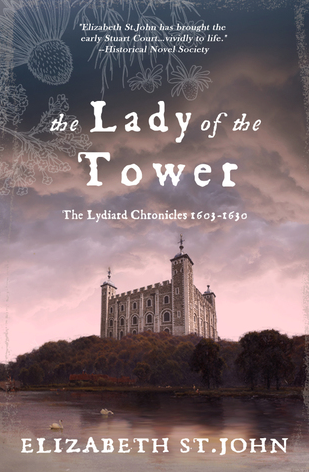
Orphaned Lucy St.John, described as "the most beautiful of all," defies English society by carving her own path through the decadent Stuart court. In 1609, the early days of the rule of James I are a time of glittering pageantry and cutthroat ambition, when the most dangerous thing one can do is fall in love . . . or make an enemy of Frances Howard, the reigning court beauty. Lucy catches the eye of the Earl of Suffolk, but her envious sister Barbara is determined to ruin her happiness. Exiling herself from the court, Lucy has to find her own path through life, becoming mistress of the Tower of London. Riding the coattails of the king’s favorite, the Duke of Buckingham, the fortunes of the St.Johns rise to dizzying heights. But with great wealth comes betrayal, leaving Lucy to fight for her survival—and her honor—in a world of deceit and debauchery. Elizabeth St.John tells this dramatic story of love, betrayal, family bonds and loyalty through the eyes of her ancestor Lucy and her family’s surviving diaries, letters and court papers.
By Love Divided

Fiercely independent, Luce Apsley rejects the dazzling English court and an arranged marriage by her aristocratic family, and falls in love with a Roundhead soldier. Desperate to rebuild their lives, her mother embraces the Puritan cause and yet Luce’s beloved brother, Sir Allen Apsley, chooses to fight for king and joins the gallant Royalists. As England marches into civil war, Luce embraces Parliament's radical views and challenges the very core of the family's beliefs. When their influential Villiers cousins raise the stakes, King Charles demands a loyalty of Allen that could jeopardize them all. Allen and Luce face a devastating challenge. Will war unite or divide them? In the dawn of England’s rebellion, love is the final battleground.
Amazon UK • Amazon US
Elizabeth St.John
 Elizabeth St.John was brought up in England and lives in California. To inform her writing, she has tracked down family papers and residences from Nottingham Castle, Lydiard Park, and Castle Fonmon to the Tower of London. Although the family sold a few castles and country homes along the way (it's hard to keep a good castle going these days), Elizabeth's family still occupy them - in the form of portraits, memoirs, and gardens that carry their imprint. And the occasional ghost.
Elizabeth St.John was brought up in England and lives in California. To inform her writing, she has tracked down family papers and residences from Nottingham Castle, Lydiard Park, and Castle Fonmon to the Tower of London. Although the family sold a few castles and country homes along the way (it's hard to keep a good castle going these days), Elizabeth's family still occupy them - in the form of portraits, memoirs, and gardens that carry their imprint. And the occasional ghost.Elizabeth’s debut novel, The Lady of the Tower, has been an Amazon best seller since its release in 2016, and has won numerous awards for historical fiction. By Love Divided, the second in The Lydiard Chronicles series, follows the fortunes of the St.John family during the English Civil War, and was featured a the 2018 Swindon Festival of Literature as well as recognized with an “Editors’ Choice” by the Historical Novel Society. Elizabeth’s currently working on the next in the series, telling of the lives of the St.John women after the Civil War and into the Restoration.
Keep in touch with Elizabeth: Website, Amazon Author Page, Twitter, Facebook.
Published on December 10, 2018 23:00
December 9, 2018
Christmas in the time of the Tudors, By Judith Arnopp #Tudor #Christmas #History @JudithArnopp

If we were to travel back in time to any Christmas during the Tudor period, we’d recognise a few of the traditions but there were others that would certainly surprise us. Religion of course played a huge part in all aspects of Tudor life and at Christmas time fasting and mass took precedence over gift-giving and carousing.
Christmas was a time of prayer and feast; the spinning wheel which occupied a corner of most homes, sat idle until the first Monday after epiphany (Plough Monday) when work would be resumed. While we adorn a tree, they decorated the spinning wheel with evergreen boughs, holly and ivy, a remnant of a ritual from pagan times.
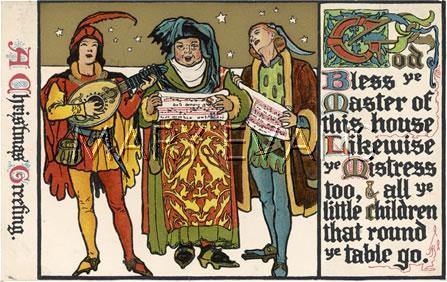
Another tradition that preceded Christianity was the Wassail in which a wooden bowl containing hot ale, spiced apple, sugar and other spices, was carried from door-to-door. Neighbours were invited to drink in exchange for a coin. For the more formal Wassail held at court, a bowl was passed around by royal stewards, the king being served last.
So now is come our joyful'st feast,Let every man be jolly.Each room with ivy leaves is drest,And every post with holly.Though some churls at our mirth repine,Round your foreheads garlands twine,Drown sorrow in a cup of wine,And let us all be merry.George Wither (1588-1667)
The yule log, a huge trunk or bundle of faggots (depending on the size of one’s hearth) was brought in from the forest. It was burned for the entire twelve days of the Christmas celebration, and it was considered lucky to keep charred remnants to start off next year’s yule fire. Aspects of this tradition are still in use today, although our log tends to consist of cake and chocolate and icing sugar.
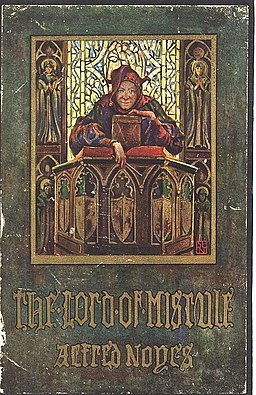
As part of the festivities in royal houses, a boy or a fool would be ‘crowned’ the Lord of Misrule. Under his command normal order was overturned and the fool became king, and vice versa. For the entertainment of the court, the Lord of Misrule could command anybodyto do anything. It was a time of total chaos and one that escapes my usually fertile imagination, for I cannot imagine Henry VIII allowing anyone to make a public mockery of him, let alone a fool … but apparently, he did.In Survey of London, published in the first year of James I rule, John Stow says:In the feaste of Christmas, there was in the kinges house, wheresoeuer hee was lodged, a Lord of Misrule, or Maister of merry disports, and the like had yee in the house of euery noble man, of honor, or good worshippe, were he spirituall or temporall. Amongst the which the Mayor of London, and eyther of the shiriffes had their seuerall Lordes of Misrule, euer contending without quarrell or offence, who should make the rarest pastimes to delight the Beholders.
In 1525 Henry VIII appointed not only a Lord of Misrule for his own household but also one for Princess Mary’s – the ensuing chaos must have been considerable and we know from records that things often got out of hand. There was even an ecclesiastic version of misrule when boy bishops were elected, often known as ‘Fool Bishop’ or ‘Fool Abbot’. John Southworth says in his book Fools and Jesters at the English Court:
‘What followed over the next few days is commonly described as burlesque, a turning upside down of the normal liturgy; it is more accurately seen and understood as the literal acting out of the Magnificat, in which the ‘nobodies’ among the clergy, as represented by the fool and his assistants, were exulted as a salutary foretaste and prophetic anticipation of the Last Judgement.’ (Southworth: p.70)
By Elizabeth’s reign, presumably having run out of ideas for inventive mischief, the practice had almost died out.

All this unbridled excitement clearly gave the Tudors an appetite, for the Christmas menu seems more outrageous (to us) than their behaviour.Poorer folk feasted on umble pie – pastry filled with the chopped and minced heart, liver, lungs and kidneys of a deer, but the affluent gorged on richer fare. Along with the traditional Christmas dishes of swan, peacock and dolphin (yes, I know) Henry VIII was the first monarch to introduce turkey to the royal table, but there were other … stranger things.
Christmas pie– sounds yummy – was rather like a Russian doll but with poultry, and consisted of a turkey stuffed with a goose, stuffed with a chicken, stuffed with a partridge, stuffed with a pigeon. This pie was served in a pastry case, surrounded by joints of hare, small game and wild fowl. May not be as yummy as it sounds then – I think I will be sticking with my nut roast this year.

And if that sounds weird, Cockenthrice was weirder still. Most of us have seen the grotesques in the margins of medieval manuscripts, strange half-beasts comprised of different animals – a rabbit with a man’s head or a lion with a dragon’s head, or a snail with the head of a cat. Well, it didn’t stop at the drawing stage. The Tudor table benefitted from dishes that were constructed in a similar inventive manner. Cockenthricewas comprised of a sucking pig, sewn to the back end of a goose (or something similar) – there are some gruesome pictures on-line - google it, I dare you!
Mince (or minst) pies might sound familiar but these were not made by Mr Kipling (other pies are available) and consisted largely of prunes, raisins, dates, powdered beef, butter, egg yolk, flour, suet or marrow, and minced mutton and seasoned with salt, pepper and saffron – these thirteen ingredients represented Christ and the apostles, all baked in a pie crust shaped like a manger to symbolise the holy birth.
Like the Christmases of today, everyone celebrated differently. Our Christmas has merged with winter celebrations of other religions, and new ideas and traditions have evolved but the Tudor Christmas is still detectable. While the Tudors broughtin greenery to decorate their homes, modern homes are largely in tinsel and plastic and lights that can be seen from space. Tudors fasted until Christmas day, Christmas Eve being especially strict with no meat, cheese or eggs. This meant that come Christmas Day everyone was ready to gorge themselves and records show that royal households consumed as many as twenty four courses! Although we don’t tend to go that far today, lots of us diet desperately to fit into a little black dress and then blow it all by over eating on the big day!
Now, as it was then, Christmas remains a time to be spent with family and friends, and however you spend yours, traditional or otherwise, celebrating with loved ones or working, make sure it is a good one, and after you’ve toasted the queen, don’t forget to raise a glass to the Tudors.
Sisters of Arden

Arden Priory has remained unchanged for almost four hundred years. When a nameless child is abandoned at the gatehouse door, the nuns take her in and raise her as one of their own.
As Henry VIII’s second queen dies on the scaffold, the embittered King strikes out, and unprecedented change sweeps across the country. The bells of the great abbeys fall silent, the church and the very foundation of the realm begins to crack.
Determined to preserve their way of life, novitiate nuns Margery and Grace join a pilgrimage thirty thousand strong to lead the king back to grace.
Sisters of Arden is a story of valour, virtue and veritas.
Pre-order your copy today!Amazon UK • Amazon US
The Forest Dwellers
Connect with Judith: Website • Blog • Amazon
Published on December 09, 2018 23:00
December 8, 2018
#Giveaway — A Fisher of Women by Catherine Magia #Biblical #HistoricalFiction @hfvbt @CatherineMagia
Historical Fiction Virtual Blog Tour presents…

A conversation with Catherine Magia
Welcome to Myths, Legends, Books & Coffee Pots, Catherine. It is so lovely to see you here. Before we begin, could you tell my readers a little about yourself?
I am storyteller and a dreamer. Traveling is a lifestyle for me (I am currently working in Tokyo, Japan during this blog tour.) I am most interested in the idiosyncrasies of people. What makes individuals and where they come from special? For example, did we know that waving is the same as flashing the middle finger in Korea? Or a mountaintop in Switzerland may have been named after Pontius Pilate? Or for a woman in Spain, going about without earrings makes her feel naked?
I am also a poet. To me, language is the source of indescribable beauty. I am Asian-American, the daughter of immigrant parents from South Vietnam. I was raised to be practical, so I have a corporate day job in a pharmaceutical company, working with cancer medicines and figuring out ways to connect the pharmaceutical industry with the patients. I specialize in helping executives and employees get in touch with the stories, dreams, and experiences of the cancer patient.
Your new book, A Fisher of Women, sounds amazing. What inspired you to write it? Stories about ancient healing have always fascinated me. As I focused on the miracles of Jesus, I began to think about what that world must have really been like. It was multi-faceted, the intersection of Hippocratic medicine, biblical miracles, and magic/sorcery of the Roman pagan world. I also work in healthcare, so the amalgam of myth and medicine, and the reimagining of the old tales using a modern medical vocabulary was eye-opening in what those ancient illnesses could have really been. This novel is a sequel, continuing the journey of Simon Peter’s wife, a woman who is as extraordinary as her famous husband. At its core, A Fisher of Women is ultimately the story of a woman, her evolution, and finding her voice. What was the role of women in those days, and how could a disciple of a new faith transcend the boundaries of her time by discovering unique talents within herself?
I so want to read your book! It sounds amazing. Did you face many challenges when researching this era of history?
Balancing the history and Christian tradition with a fresh and truly original perspective was a challenge, as so many readers of the genre already have strong ideas of what it should be. I sought to be as authentic to history/Bible as possible by an academic and comprehensive study of theology, history, and politics. I also visited the Middle East several times to provide a vivid and cinematic vision of atmosphere, the angle of the trees, colors of the sky, spices of the market, the glittering limestone of Jerusalem. I also spent a fair amount of time researching pagan rituals and did a crash course on hypnosis, in order to understand a magician/sorceress of the ancient era.
It sounds like an awful lot of research has gone into A Fisher of Women. Can you tell us three things that set your book apart from other Historical Christian Ficiton?
1) The synergy of ancient medicine, biblical miracles, and pagan sorcery is unique to my novel. To my knowledge, no one has addressed the miracles of Jesus in the context of detailed understanding of pagan magicians, and reinterpretations of ancient illnesses with modern medical vocabulary. For example, were demonic possessions mental illnesses like schizophrenia? Could the withered hand have been osteoarthritis? Was the bleeding woman suffering from hemophilia? Three different doctors (oncologist, neurologist, and pain management specialist) had reviewed my novel for medical accuracy.
2) Some of the characters in my novel were also never explored before. Helen the Magician was not a character I invented. Historically, she was the consort of Simon Magus, a historical entity who was mentioned in the Acts of the Apostles and was also a magician in Nero’s court. Legend has it they were both revered as gods in certain parts of the Roman Empire, due to their sorcery. Now, since by book is about women, who is to say that he taught her magic? Maybe she taught him.
3) My imagination of what the healing miracles do to Jesus. I believe that all great things come at a cost, even if they are not visible to us. Healing miracles have a price as well, and someone always has pay that price.
The more I hear about your book, the more I want to read it! Can you tell us what you are currently working on?
I am currently working on the third book of the Fisherwoman Trilogy. This final book juxtaposes the revolutionary history of Israel against the well-known stories of the Bible. Additionally, I am working on my mother’s memoirs, who was an immigrant who fled the Communist invasion of South Vietnam.
One more question, just for fun. If you could meet any historical monarch, who would it be?
I would love to meet WuZeTian. She was a monarch of the Tang dynasty, one of China’s most affluent and dynamic periods in ancient times. She was the only woman throughout Chinese history to be proclaimed “Emperor,” not based on her relationship as wife or mother or regent to a male king, but an Emperor in her own right. She entered the Imperial Palace at the age fourteen as a lower grade concubine, and she ascended through wit and ingenuity to become Empress and then finally to assume the throne itself in her forties. Unlike other women in Chinese history who were perceived as destructive, she had a reputation for fairness and contributed substantially to the wealth and prestige of the Tang dynasty. She had a saying, “While the sun is resplendent and garish, it still sets in the west. Even though the moon is subtle and soft, it still dominates the heavens. Therein lies my opportunity.” As a woman, I am inspired by the invisible and subtle ways we can influence the world.
It has been so lovely to meet you, Catherine. I do wish you all the best with the rest of your tour.
Scroll down to find out more about A Fisher of Woman and if you would like to be in with a chance to win a copy of Catherine’s new book, be sure to enter the Giveaway.
A Fisher of Women
By Catherine Magia

When the wife of Simon Peter returns to Galilee, she brings nothing but her faith in an enigmatic carpenter named Jesus, who has an extraordinary gift of healing the sick. But as she spends time in the presence of this divine leader, she discovers the gift of healing comes at a devastating cost. A terrible burden Jesus bears for the sake of his love for humanity.
In her quest to alleviate Jesus’s eternal suffering, the wife of Simon Peter befriends a pagan magician named Helen. Helen possesses a wisdom and healing power exceeded only by Jesus himself, but bears an unsavory reputation. Can Helen be trusted to ease Jesus’s suffering? Or is she a rival seeking his ultimate destruction?
Simon Peter is immortalized as a devoted pillar of the early Church. This is the untold story of his wife, forgotten as a healer and invisible to the pages of history. Her journey leads her to understand the inevitable price of healing, and what it truly means to love.
“The story is smoothly written, with clear characters, a mix of scripture and historical events presented in an easy to follow manner… Letting go of fear, learning to forgive, and healing with more than just faith, will require a journey Simon Peter’s wife did not expect.” Sarah Bradley, Ind’tale Magazine
“Author Catherine Magia presents an intense story of Peter’s wife who struggles against many odds, including the her husband’s refusal to accept his wife as his equal as a disciple. The story takes place in and around the Sea of Galilee, the home base of the first disciples of Christ, which comes alive in the readers imagination. Familiar biblical characters are portrayed as deeply human, both in their flaws and in their redemptive moments.”E. Ann McIntyre, author of Lazarus of Bethany and Feast of Pontius Pilate, member of Catholic Writers’ Guild.
Giveaway
During the Blog Tour we will be giving away an eBook of A Fisher of Women! You can enter:
HERE!
Giveaway Rules
• Giveaway ends at 11:59pm EST on December 19th. You must be 18 or older to enter.
• Giveaway is open to US residents only.
• Only one entry per household.
• All giveaway entrants agree to be honest and not cheat the systems; any suspect of fraud is decided upon by blog/site owner and the sponsor, and entrants may be disqualified at our discretion.
• Winner has 48 hours to claim prize or new winner is chosen.
Available on Amazon
Catherine Magia
 Catherine Magia’s debut novel The Fisherman’s Bride won the 2017 New England Book Festival. She was born in Brooklyn, New York, and moved to New Jersey at the age of ten. At eighteen, she won a creative writing scholarship to Drew University, where she studied political theory and chemistry. Although her formal education was in the hard sciences, Catherine has always maintained a passion for the written word, publishing her poetry in several literary journals including the Michigan Quarterly Review.
Catherine Magia’s debut novel The Fisherman’s Bride won the 2017 New England Book Festival. She was born in Brooklyn, New York, and moved to New Jersey at the age of ten. At eighteen, she won a creative writing scholarship to Drew University, where she studied political theory and chemistry. Although her formal education was in the hard sciences, Catherine has always maintained a passion for the written word, publishing her poetry in several literary journals including the Michigan Quarterly Review.She discovered the voice of Simon Peter’s wife on a soul-searching journey, a trek through the biblical lands of Israel, Jordan, and Egypt. She spent seven years researching and writing her debut novel, traveling as far as Ephesus, Turkey.
The Fisherman’s Bride was described as “unique and authentic” by the Booklife Prize, indie division of Publisher’s Weekly. The Historical Novel Society has praised the book as “complex and engaging,” while Reader’s Favorite Magazine has lauded it as “literature,” awarding it the Silver Medal for Historical Christian Fiction.
A Fisher of Women, the sequel to The Fisherman’s Bride, was released on October 3rd. She is currently writing and researching the third book of The Fisherwoman Series.
By day, she works as a director of market insights in the development of new cancer medications. She is focused on connecting cancer patients and their stories to the executives and employees of the pharmaceutical industry. She is currently based in Boston.
Connect with Catherine: WEBSITE | FACEBOOK | TWITTER | GOODREADS | AMAZON
Published on December 08, 2018 23:00
Let's talk about Book Trailers... #BookTrailers #Promotion #Publishing @LPOBryan
What is the purpose of a book trailer?
“Book trailers can be used to liven up a web site, for posting on social media and on YouTube. They don't produce a short-term sales boost, but they do help over time, if they are on your site and posted occasionally to social media to pull people to your site and/or your book on Amazon…”
Laurence O’Bryan, Founder of Books Go Social

That is going to cost a lot of money, right?
I have secured a fabulous 10% discount on Books Go Socials already very reasonably priced book trailers.
Check out these awesome trailers produced by Books Go Social.
Embellished (Chronicles of Orian Book 1) by Karen Glista (Book Trailer)
Kingdom of the Medallion by David A. Wagner (Book Trailer)The Land Founding (Book Trailer)Mistress Suffragette by Diana Forbes (Book Trailer)
Who are Books Go Social?

Books Go Social (BGS) is a highly respected Author Promotion service — you may have already heard of them. The founder of BGS, Laurence O’ Bryan is dedicated to helping authors showcase their books. He knows what works and what does not. This is why I am so excited to be working with him on this fantastic deal.
To get your 10% discount click on:
Books Go Social Book Trailer Promotion
and type:
madec18
at the checkout.
Recommended by

Published on December 08, 2018 03:37
December 7, 2018
Christmas in the time of a Regency Frost Fair, by Jackie Williams #Christmas #Regency @wackyjackyful

Christmas in the time of...
A Regency Frost Fair
By Jackie Williams
The last great Frost Fair on the Thames came during February 1814. A spectacle never to be repeated after the demolition of the original London Bridge. The deepening of the river and the more widely spaced support arches in the new construction meant that the tide travelled more quickly, preventing the ice forming, to a safe depth for a Frost Fair, ever again.
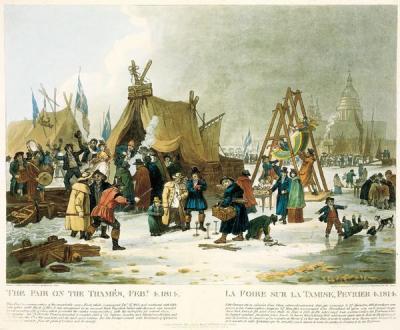
But on the day of the 1814 Thames Frost Fair, amongst games of skittles, fortune tellers, and gamblers, one man set up his printing press and printed out his 124 page book. A History of the River Thames in a Frozen State, was published while in his ‘print shop’ set up on the Thames. Another enterprising person lit a fire and roasted a pig to the delight of many a hungry visitor. And in one of the greatest, most talked about sights, an elephant walked on water, crossing the Thames on the ice near Blackfriars Bridge.
Who would have imagined such a spectacle? And wouldn’t it have been fabulous if it had happened at Christmas...
Let your imagination run wild while you enjoy a short excerpt from my as yet unnamed 8th book in the Unrivalled Regency series.
Crisp air assaulted Lucinda Eliot’s cheeks. Ducking her head, she tucked her precious bundle tighter against her chest before taking a last glance at the haven she would probably never return to, and stepped out into the freezing Christmas morning. A great flow of people swept around her, voices buzzing with excitement. Lucinda already knew what the commotion was about. One of the coffee shop’s early customers had already spread the news. The winter’s chill had become extreme, freezing the great river from Fulham to Putney. It had been years since such a frost had blighted the capital. A tide of curious Londoners were gathering that Christmas morning to view the scene. And along with the crowds came a hoard of traders and entertainers determined to take advantage of the unexpected ice’s rich pickings. A juggler tossed his brightly coloured balls alongside a man selling fur muffs. Fairground rides swung eager children over the heads of an enthusiastic choir singing Christmas carols. A decorated tree stood proud and pretty in an earth filled barrel. Someone had brought out a steaming cauldron of mulled wine and its spiced scent filled the frigid air, tempting many of the shivering crowd into an eager bout of early festive drinking. Lucinda gave a wistful sigh. She wasn’t sure when she might be able to afford her next glass of milk let alone a cup of the seasonal brew. Bypassing a fortune teller’s tent, she ignored the mystical crystals and amulets hanging about the entrance. What would be the point in hearing about her future? She already knew that it was bleak. She startled as a man with baskets of oranges at his feet suddenly called out, his coarse accent thick with common tones. ‘Penny for a noringe! Tuppence for three!’Her favourite fruit! Her cheeks sucked in and she swallowed hard. But while her mouth watered, she shook her head and began to move away. She had but a few coins in her purse. There would be none of the tangy but sweet delight for her. However, his cries attracted the attention of others - a group of well-dressed young ladies riding by in their horse drawn sled. Lucinda glanced up enviously at the warmly clad, chattering women. Her own coat was thin, more suitable to a carriage trip during a mild spring afternoon than a walk on a frozen river in December. But it was Christmas day and though she had nowhere to go, nowhere warm to stay, Lucinda had wanted to see the fair. One of the women on the sleigh laughed over Lucinda’s head. A tinkling, light-hearted sound that had her friends joining in. All except one, a slender slip of woman who kept her head down and her lips pressed together. Lucinda wondered why the young lady didn’t find her companion’s comments amusing. She stared a moment longer as a hand reached out and tapped the reticent lady on the shoulder. Lucinda quickly ducked her head. She clamped her chattering teeth together as the unamused lady lifted her chin. Familiar golden curls peeped out from beneath a thickly fur-lined hood. Clarissa Eliot’s smile didn’t quite reach her eyes, though she gave a fair imitation of looking happy. But Lucinda could tell the difference in her younger sister. While the young woman’s friends cooed at the unfamiliar spectacle of a thoroughfare made of ice, Clarissa appeared to be disinterested, her dark eyes haunted, shadowed beneath and hollow. Even the sight of an elephant crossing the frozen water seemed to hold no allure.
“An elephant! My, look at that!” One of the ladies pointed a glove covered finger. “Good heavens! There really is an elephant! I thought George had been at the port when he told us about it, though it is a little early even for him. Clarissa, do you see?” Another clutched at the blonde’s arm.Clarissa Eliot blinked away her worries and smiled at the unusual sight.“I hope someone has tested the depth of the ice,” she commented, her voice only just audible above the general commotion.Her companions laughed.“Of course they have. The temperature has dropped so low there is apparently eighteen inches of ice between us and the water.” One of them assured their friend.Clarissa shivered and turned back towards the orange seller. “Noringes! Noringes! Penny for one, tuppence for three!” The man dug this thumbs into the bright flesh as he shouted across the frosty route, the deliciously tart scent reminding Clarissa of her sister’s love for the citrus fruit. Her heart leapt to her throat, threatening to choke her. She had last seen Lucinda in the summer. Clarissa’s eyes filled with tears and nearly blinded her as she recalled the quick goodbye. A swift kiss on her cheek in the early hours of the morning. She hardly remembered it happening, her eyes only just opening as Lucinda fled their home, her departure swift and secret. If only she had known why.
Lucinda stood transfixed, the elephant and the orange seller forgotten as she gazed at her beautiful sister. Could she have done things differently? Lucinda didn’t know. She regretted many things about last summer, but as her bundle gave a wriggle, she knew there were some things that she would never change. At the time, being jilted while almost at the altar had rated highly amongst the most horrendous days of her life. But she knew now that the hurt and embarrassment of that day were nothing in comparison to what had followed. And not being able to explain her flight to Clarissa had weighed heavily on Lucinda’s heart, But given her situation, what alternatives had she? She wiped the thought from her mind. Nothing could change what had happened. Reliving the circumstances of her departure wasn’t going to make them disappear. Cuddling her bundle close, she turned. She no longer belonged in the world of aristocratic ladies, wearing furs or riding in horse drawn sleighs, and needed to slip away. But the bundle she held to her chest gave a more forceful wriggle, followed by small, nagging cry which soon became an ear-splitting yowl of proportions incommensurate with the tiny child’s size. Baby Holly, though only a little more than two week’s old, let everyone within hearing distance know that she was either hungry, wet, or cold, or possibly all three.Lucinda hushed the squalling infant, but her pleas were ignored. An arm escaped its blanket and waved about in the wintry air. Lucinda tucked it back inside the blanket. It was too cold for the child to be exposed, but the little face reddened dramatically, the baby’s indignation of being so confined evident for all to see.
Distracted from both the orange seller, the elephant, and her friends, Clarissa stared at the baby screaming fit to burst. And then she looked at the woman trying to comfort it. Forcing herself not to faint, Clarissa stared in shock.“Lucinda?” She breathed gently, her eyes suddenly sparkling as brightly as the frost underfoot. “Lucinda! Is that you?” The woman holding the infant lifted her head, their eyes meeting for a long moment, before quickly turning away. She began running on the ice, sliding once and nearly falling before she found her footing once again and dashed into the gathered crowds.Clarissa didn’t hesitate. She jumped from the sled, skidding onto the ice. Gathering herself and throwing some coins at the orange seller, she grabbed some of the fragrant fruit before running after her sister. A sister that she hadn’t seen in more than half a year.“Stop! Wait!” She called after the retreating figure and stretched out her stride. Thank goodness she had worn a dress with plenty of skirt. The distance between them lessened before Lucinda suddenly changed direction, slipping and crying out as she dashed around the now red faced choir. The baby flew into the air as the woman hit the unforgiving ice.“Holly!” Lucinda screamed and twisted, clearly desperate to see where her baby had landed. But she didn’t have to look far. Clarissa sat on the ice a few feet behind her, oranges rolling about her while in her arms lay the now contentedly cooing child. Clarissa stared down at the baby she had deftly caught and lifted the blanket away from its face. Pink spots lit the child’s cold cheeks as it blinked its bluer than blue eyes. “What a beautiful child!” She exclaimed and looked back at her sister.Lucinda scrabbled to her feet.“Give her back to me.” She demanded as she held out her arms.Clarissa ignored her and tilted her head as she looked back down at the child. “A girl? Max’s?” She asked on a breath, though she already knew the answer. Lucinda closed her eyes for a moment, settling the thump of her heart before shaking her head.“This isn’t Max’s baby. He married another. He had promised himself to me, but he married another.” The desolate tears couldn’t be stopped. They dripped onto the ice.Clarissa gasped as she was suddenly helped to her feet, a crowd gathering around her. She tried to push them away, but holding the baby securely took the use of her arms. She craned over the concerned crowd, eyes searching frantically for her sister.“No! He didn’t! Max didn’t marry anyone.” She didn’t know whether Lucinda heard.But then chapped hands reached through the throng and took the baby. “Don’t lie to me, Clarissa. I have to live with what I have done. And so does he. Isn’t that enough.” Lucinda tugged the baby back into her arms.Clarissa tried to shake off her meddlesome friends.“Who is that beggar woman? Ugh! Did the infant soil your dress, Clarissa? It is too bad. London is full of vagrant and thieves. Go away! Go away and leave our friend alone! If you have picked Lady Clarissa’s pockets...”The rest of the woman’s comments were lost as Lucinda dragged her baby back into the shelter of her thin overcoat and vanished into the throng still enjoying the ice.But Clarissa wasn’t about to let her sister disappear again. She glowered at her friends. “Leave me alone. Do not stand in my way. I need to speak to that woman. Immediately!” Her anxious tones rose in pitch as she struggled against her friends and concerned passersby.Her friends gave her some room, but remained in a circle around her. All of them curious, questioning Clarissa’s reason. Though Clarissa could hardly expect any different. Even her parents had given up on her. Clarissa had only ventured out this Christmas day to stop them from calling the doctor. Not that any medicine he prescribed could help her out of her depression. For what kind of potion could cure a grieving heart? A heart that suddenly pounded out a deafening rhythm.“But she’s a vagrant, possibly a whore! We won’t let you go after her.”A shocked voice cut through Clarissa’s thoughts.Clarissa felt her anger rise. She had brooded over the loss of her sister long enough. This time she wouldn’t remain silent. Not when she had just discovered that she had been lied to. “How dare you call Lu...” She closed her mouth before she revealed her sister’s shocking secret, but her mind ran in wild circles. She had thought Lucinda dead. That was what she had been told. But it was clear the truth had been denied her. Clarissa’s heart thumped in an erratic rhythm. Lucinda was alive! And had been holding Max’s baby. Though Lucinda had rejected that claim, there could be no denying the child’s heritage. The adorable little girl was the image of her father. A man who now lived desperate and alone, shunning the world after losing the woman he loved. A woman who had apparently now risen from an early grave and who clearly didn’t know the facts.Clarissa turned away from her friends and stood staring after... No one. Her heart plummeted into her stomach. Where had Lucinda gone? Clarissa stood on her tiptoes, then ran onto the choir’s makeshift stage. She scanned the masses around her, desperate to catch any sight. But it was hopeless. The crowd had become thicker, everyone keen to see the elephant, to eat the oranges, or have their fortunes read. It seemed that the whole of London had come to experience Christmas at the Frost Fair. And her sister, clearly alone, afraid, and thinking herself abandoned, had disappeared into the chattering throng making merry on the glistening ice.
I hope this excerpt has given you a flavour of Christmas at a Frost Fair. The 8th book in the Unrivalled Regency series will be coming early in 2019. In the meantime, you can read more about the seven previous standalone romantic mystery stories HERE!

And you can discover me on: Website • Newsletter • Blog • Google + • FaceBook • Twitter • Instagram •
Jackie Williams
 I was born in Essex England during the mid sixties but I missed all the fun. Being only young, I assumed that all Beatles were six legged creatures and Flower Power was something to do with the vigorous way my mother kneaded the bread dough.
I was born in Essex England during the mid sixties but I missed all the fun. Being only young, I assumed that all Beatles were six legged creatures and Flower Power was something to do with the vigorous way my mother kneaded the bread dough.My wonderful parents brought me up with a huge love of books. We read anything and everything. Bedtime stories were a treasured time of adventure and mystery. My sister and I sat wide eyed in wonder and to this day I worry about Dinah and Dorinda being pricked with pins because they grew so fat, and I never pull faces at the a waning moon (or was it a waxing one?) just in case my chops stay that way . (The Wind On The Moon)
I began reading romance while still at school. The fuel for many a teenage fantasy leapt from between the covers of wildly romantic books and my passion still lingers now for all those dark haired heroes.
After being challenged by my husband, my own beautiful teenage daughter persuaded me to write my first romance. She was only fourteen at the time and between books for children and adults. She couldn't find anything that ticked all her numerous and particular boxes and so she asked me to write a book, with all the exact ingredients just for her. Though not just a book for teens, she enjoyed the resulting tale so much that she shared it with her friends and I eventually published A Perfect Summer as an ebook on amazon.
But I have discovered that writing is not easily stopped once you start. It has turned into a grand passion that I just cannot hold back. The fingertips start tapping the keys and ideas suddenly come flooding, far too many for just one book and so I began another and then another, 31 books later I am still nowhere near done.
I hope you enjoy all of my efforts and I look forward to your comments and reviews.
Published on December 07, 2018 23:00
The Coffee Pot Book Club
The Coffee Pot Book Club (formally Myths, Legends, Books, and Coffee Pots) was founded in 2015. Our goal was to create a platform that would help Historical Fiction, Historical Romance and Historical
The Coffee Pot Book Club (formally Myths, Legends, Books, and Coffee Pots) was founded in 2015. Our goal was to create a platform that would help Historical Fiction, Historical Romance and Historical Fantasy authors promote their books and find that sometimes elusive audience. The Coffee Pot Book Club soon became the place for readers to meet new authors (both traditionally published and independently) and discover their fabulous books.
...more
...more
- Mary Anne Yarde's profile
- 159 followers



